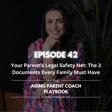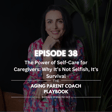Become a Creator today!Start creating today - Share your story with the world!
Start for free
00:00:00
00:00:01

Episode 39: Handling Emergency Situations with Aging Parents: How to Stay Calm and Prepared
Emergencies happen without warning—and when it’s your aging parent, the stress can be overwhelming. In this episode, Dr. Barbara Sparacino shares exactly what to do in a medical crisis, which documents you must have ready, and how to build an emergency plan that works under pressure.What You’ll Learn:
• The first steps to take in a medical emergency.
• The “go bag” checklist every caregiver needs.
• Which documents can make or break decision-making in a crisis.
• How to create a family emergency plan that reduces confusion.Links & Resources:
• Download the FREE Emergency Preparedness Checklist – www.theagingparentcoach.com
• Follow Barbara on Instagram – @theagingparentcoach
Transcript
Introduction to Medical Emergencies with Aging Parents
00:00:00
Speaker
Welcome back to the Aging Parent Playbook. I'm Dr. Barbara Sparacino and today we're talking about one of the most important and honestly most stressful parts of caregiving. Handling a medical emergency with your aging parent.
00:00:13
Speaker
If you've been a caregiver for more than five minutes, you know the reality. ah emergencyencies Emergencies don't give you a heads up. You might be cooking dinner when mom calls to tell you she fell.
00:00:24
Speaker
You might get that 2 a.m. phone call from the assisted living nurse saying dad's on his way to the ER. And in those moments, your brain can feel like it's short circuiting.
00:00:37
Speaker
What do you do first?
00:00:41
Speaker
Do you have the right documents? How do you stay calm enough to make smart decisions? That's exactly what we're covering today.
Key Steps in Responding to a Crisis
00:00:52
Speaker
You'll walk away knowing how to respond in the first moments of a medical crisis.
00:01:00
Speaker
the must have documents that make emergencies smoother, how to create an emergency plan that reduces panic and confusion, because I want you to walk you through not just what to do, but how to prepare in advance so you're not scrambling in the middle of chaos.
00:01:20
Speaker
So in this first segment, we're gonna talk about what to do in a medical crisis.
00:01:28
Speaker
When a medical emergency happens, you don't have the luxury of time. You have to act. But the irony is acting without thinking can also make things worse. That's why preparation is half the battle.
00:01:43
Speaker
Let's walk through what happens step by step. So step one, assess and call 911 when one one needed. If your parent has chest pain or difficulty breathing,
00:01:56
Speaker
sudden confusion, drooping on one side or so stroke symptoms. If there's a serious fall or head injury, severe bleeding or loss of consciousness, call 911 immediately.
00:02:10
Speaker
Do not wait and see. Seconds can matter in these situations.
Staying Calm During Emergencies
00:02:15
Speaker
I once had a father, and once had a client whose father showed mild stroke symptoms, but they thought he was just tired.
00:02:22
Speaker
By the time they got him to the ah ER hours later, Treatment options were limited.
00:02:29
Speaker
Time is brain tissue when it comes to stroke.
00:02:34
Speaker
Step two, stay calm and reassure them. Even if you're panicking inside, speak slowly and steadily. If they see your fear, their anxiety spikes and that can worsen symptoms like shortness of breath or chest pain.
00:02:50
Speaker
Sometimes I'll even say, we're gonna get through this together. while making eye contact.
Preparing an Emergency Go Bag
00:02:59
Speaker
Step three, grab the go bag. This is a non-negotiable. Your go bag should include insurance card and photo ID, an updated list of medications, dosages and allergies, a change of clothes, essential medical devices, glasses, dentures, hearing aids, any mobility aids if they're portable,
00:03:22
Speaker
Keep it by the front door or somewhere obvious and replace any outdated paperwork every three to six months.
Legal Preparations and Documentation
00:03:40
Speaker
Segment two, the critical documents you need. One of the biggest mistakes I see, families scrambling to make decisions without the legal authority to do so. That's when treatment gets delayed or worse, decisions are made by strangers in a courtroom.
00:03:55
Speaker
Here's what you absolutely need before an emergency.
00:04:02
Speaker
Number one, an advanced directive. This outlines your parents' medical wishes. For example, do they want aggressive interventions or do they want comfort care? This removes the burden of guessing.
00:04:14
Speaker
Two, a durable power of attorney or a POA. This allows a designated person to make medical and financial decisions if your parent can't. Without this, even paying a hospital bill can get complicated.
00:04:27
Speaker
Three, an emergency contact list. Include all doctors, specialists, preferred hospitals, and close family members. Have both physical and digital copies of this. 4. list of medical conditions.
00:04:40
Speaker
Don't assume every ER visit will have their full medical visit but medical record available. A short summary can help the care team move faster. I recommend storing copies in three places.
00:04:52
Speaker
The go bag, your car glove compartment, and a secure shared folder like Google Drive so other family members can access them if needed.
Creating and Practicing an Emergency Plan
00:05:04
Speaker
In segment three, we're gonna talk about creating your emergency plan.
00:05:10
Speaker
So emergencies will always be unpredictable, but you can create a plan that makes your response automatic. So here's how to start. First, choose a decision maker.
00:05:22
Speaker
Identify who will speak to doctors, sign forms and make the tough calls. Two, map your hospitals. Know where the closest yeah ERs are and which ones specialize in stroke or cardiac care.
00:05:35
Speaker
3. Assign roles. Who rides in the ambulance? Who stays back to grab the bag? Who calls other family? 4. Practice. Run through the steps like a fire drill.
00:05:46
Speaker
It might feel silly, but it can save minutes in a real crisis. And remember, if you're the main caregiver, you also need a backup person. Illness, travel, or burnout can take you out of commission.
Encouragement to Listeners: Be Prepared
00:06:05
Speaker
Emergencies are stressful by nature, but with preparation, you can turn panic into action. Your homework, create or update your go bag this week.
00:06:18
Speaker
Check all that all critical documents are signed and easy to access. Talk to your parent and your family about your emergency plan.
00:06:29
Speaker
I've put together a free emergency preparedness checklist you can download At theagingparentcoach.com, it walks you through everything we discussed today so you can start preparing immediately. and Until next time, remember, being prepared is one of the greatest gifts you can give both yourself and your parent.
00:06:48
Speaker
So take care.



















